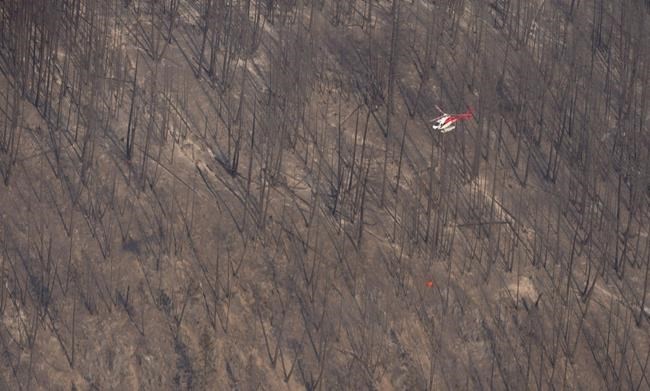
FILE PHOTO - A helicopter carries a water bucket over a burnt out area of the Philpot Road wildfire just outside of Kelowna, B.C., on Monday, August 28, 2017. British Columbia's Forests Minister says the historic wildfire season that has charred more than 11,500 square kilometres of land will have lingering implications for the logging industry.
Image Credit: THE CANADIAN PRESS/Jonathan Hayward
September 07, 2017 - 7:00 AM
WILLIAMS LAKE, B.C. - British Columbia's Forests Minister says a historic wildfire season that has charred more than 11,500 square kilometres of land will have lingering implications for the logging industry.
Doug Donaldson said an estimated 53 million cubic metres of timber has burned, which calls for support of harvesters already licensed to collect trees within the fire zone while new licences are issued to salvage usable wood in areas that weren't previously accessed.
Those efforts are well underway, along with long-term plans focused on the sustainability of the industry, Donaldson said Wednesday.
"We know there is going to be an extremely high need for reforestation and that's been planned right now through my ministry in order to ensure that we do have the timber supply in the future," he said. "But there is no question that there's going to be an impact from that much timber being burned in the province."
Susan Yurkovich, president of the BC Council of Forest Industries, said although mill infrastructure hasn't been destroyed by fires, shortage of timber and wood fibre, especially in the Interior, means companies can't operate.
"We're not able to get into the forest obviously to do logging because of the fire activity so that's going to have an impact on mills being able to run," she said.
Many companies have been involved in fire suppression efforts and working with first responders to keep employees and their families safe.
As fires are extinguished, Yurkovich said salvaging usable timber and looking at other areas to harvest wood are priorities to allow mills and the communities around them to get back to work.
"When they've been through this kind of incident, they need to get back to normal, they need to get into their homes and they need to get back to work," she said.
David Elstone, executive director of the Truck Loggers Association, said even on the coast where fires have been less severe than in the Interior, contractors have seen a decline in work this season.
"We can't estimate how much of the workforce right now is not actually out there on the land working because of the dryness and the hazards but there are certainly contracting communities that aren't out there in full force."
The BC Wildfire Service said 158 fires are still burning in the province, bringing the total number since April 1 to 1,212 blazes.
Yurkovich said the industry is working closely with the provincial government on recovery efforts, and discussions about changing forest-management practices are expected to continue beyond the current fire season.
— By Linda Givetash in Vancouver; with files from Laura Kane.
News from © The Canadian Press, 2017